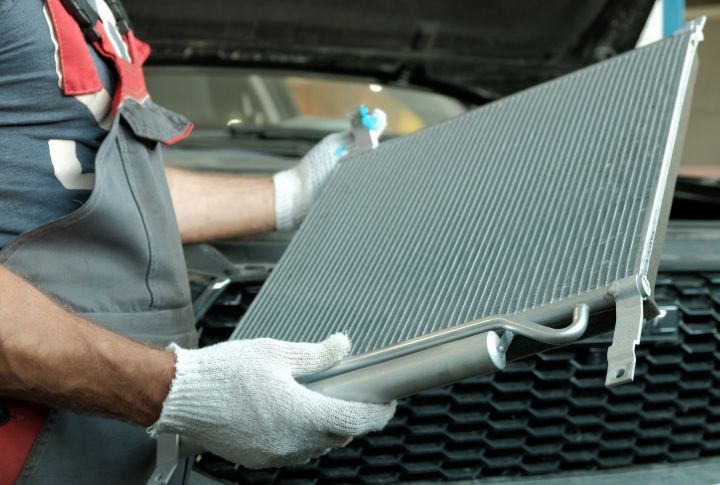
From unnecessary idling to misguided fuel choices, let’s explore why these widely circulated tips don’t hold up under scrutiny. Armed with the truth behind these myths, you’re better equipped to care for your car correctly. Feel free to consult experts to guarantee optimal choices for your vehicle’s well-being.
“Let your car warm up for 20 minutes before driving in winter.”

Modern vehicles are manufactured to operate efficiently without prolonged warming up, even in chilly conditions. Excessive idling can lead to wasted gas and increased engine wear, undermining the automobile’s horsepower and longevity.
“A louder exhaust means more power.”

Enhancing your car’s exhaust system for noise is a common misconception that doesn’t translate to improved efficiency. Actual gains in horsepower and torque require thoughtful modifications, not merely volume increases contributing to noise pollution.
“Premium fuel boosts acceleration in all cars.”

While top-ranked engines calibrated for premium fuel can benefit from its use, most autos run optimally on regular unleaded. Opting for higher-octane gas in a car that doesn’t require it won’t boost performance and will only empty your wallet faster.
“Wash your car with dish soap for that extra shine.”

Contrary to popular belief, dish soap can harm your car’s finish by stripping away waxes and sealants crafted to protect the paint. Automotive-specific soaps are formulated to clean without removing these vital layers of protection.
“You can use water instead of coolant in a pinch.”

Substituting coolant with water can harm the engine due to corrosion and inadequate boiling or freezing protection. Proper antifreeze mixtures are essential for maintaining temperature regulation and preventing costly damage.
“Roll down the windows to save fuel.”

The belief that avoiding air conditioning in favor of open windows will save fuel is misguided at high speeds. Aerodynamic drag increases gas mileage more significantly than the A/C, making it less efficient on highways.
“Inflate tires to the pressure listed on the tire sidewall.”

The pressure indicated on a tire’s sidewall is its maximum capacity, not the recommended level for best performance. Adhering to your car manufacturer’s guidelines, usually found on a sticker inside the driver’s door, ensures optimal handling and tire longevity.
“Change your oil every 3,000 miles, no matter what.”

Older vehicles once required frequent oil changes, but technical advancements have extended intervals up to 10,000 miles for some cars. Consulting your owner’s manual for the proposed schedule prevents unnecessary upkeep and environmental waste.
“You don’t need to replace your timing belt until it breaks.”

Delaying the replacement of a camshaft drive belt until failure can result in catastrophic engine damage. Following the manufacturer’s recommended interval for timing belt replacement is critical for avoiding expensive repairs and ensuring automobile security.
“Brake fluid doesn’t need to be changed.”

Ignoring brake fluid maintenance can compromise your four-wheeler’s braking efficiency, as moisture absorption leads to deterioration. Regularly replacing hydraulic oil according to your care schedule is vital for safe and effective braking.
“All-season tires in snow will do just as fine as the winter ones.”

While all-season tires provide versatility, winter tires are specifically designed for superior traction and safety in snowy and icy conditions. Investing in the latter can dramatically improve your auto’s cold-weather mileage.
“Bigger cars are always safer.”

Vehicle size is just one factor in overall preservation; advanced technologies and structural designs play a significant role. Many smaller ones now offer advanced security features and have achieved high ratings in crash tests, challenging the notion that oversized automobiles are far more efficient.
“You can fix small windshield cracks with clear nail polish or super glue.”

Applying clear nail polish or super glue to windshield cracks might seem like a clever hack, but it can impair visibility and weaken their structural integrity. Professional repairs or replacements are necessary for safety and durability.
“Use bleach to clean your radiator.”

Introducing bleach to your radiator is a harmful idea that can lead to corrosion and damage to your four-wheeler’s cooling system. For proper maintenance and cleaning, rely on products specifically designed for automotive cooling systems.
“Go for manual transmissions to get better fuel economy than automatics.”

Technological advancements in automatic stick shifts have leveled the playing field with manual transmissions regarding energy conservation. Many modern automatics offer equal or superior gas utility, debunking the old myth that manuals always come out on top.
